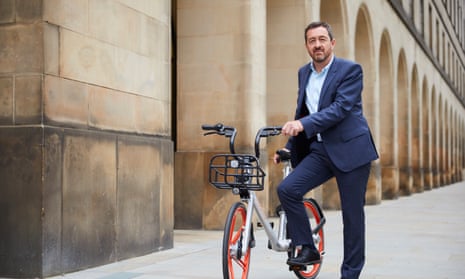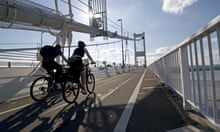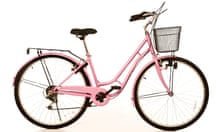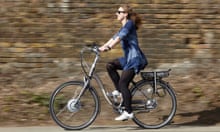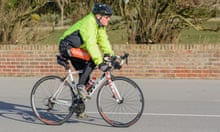A thousand miles of safe cycling and walking routes are to be created in Greater Manchester after an Olympic gold medallist persuaded town hall bosses to spend as much on cyclists and pedestrians as Amsterdam and other cycling nirvanas.
The network – named Beelines, in homage to Manchester’s civic symbol of the worker bee – includes 75 miles of Dutch-style segregated lanes and will be the largest joined-up network in the UK.
The plans, published on Wednesday, have a combined cost of around £500m and represent a first step in £1.5bn planned investment.
Andy Burnham, Greater Manchester’s mayor, has allocated £160m of the government’s Transforming Cities fund to the project’s first four years, bringing the total spend on cycling and walking in Greater Manchester to around £15 per head. This funding is at the levels seen in cycling Meccas such as Copenhagen and Amsterdam and higher than in any other UK city, according to Chris Boardman, the region’s walking and cycling commissioner.
Boardman, who won gold at the 1992 Olympics and wore the Yellow Jersey in the Tour de France, is also lobbying the government to allow him to change traffic lights to give cyclists and pedestrians more time and priority to cross busy junctions safely.
He said he was “absolutely unapologetic” that his plans would take space away from cars and could make motor journeys slower in what is already a traffic-snarled region.
“If you want to make people change their habits you’ve got to give them a viable alternative and in some cases that’s reprioritising streets and that’s what we are doing,” he said in an interview with the Guardian.
“We’ve given way too much priority to the vociferous minority,” said Boardman, referencing motorists. “We’ve wrongly prioritised road space.” Studies in New York found that 80% of people on roads were pedestrians on the pavement, which “gave engineers the courage to change street design” he said.
Once built, the Beeline network will better connect every community in Greater Manchester, opening up almost 90% of the city-region, said Boardman. He said a Beeline sign would indicate that “a competent 12-year-old”, the proxy he uses to indicate a vulnerable road user, would be safe.
“You’ll feel comfortable if you follow this sign. If it’s on a major road it will be segregated, if it’s on a minor road it won’t be,” he said.
Since his appointment last year, Boardman and his team have worked with each of Greater Manchester’s 10 combined authorities on the plans. Each borough has been allowed to choose one key route where segregated lanes will appear over the next six years, with most opting for a busy road into Manchester itself.
The proposals, which are subject to formal approval by Greater Manchester combined authority on Friday, also includes plans for 1,400 safe crossings that will facilitate the majority of routes and 25 “filtered neighbourhoods”, where the priority is given to the movement of people and where spaces to sit, play and socialise are created.
Around 250 million car journeys of less than 1km (0.6 miles) are made per year in Greater Manchester; the equivalent of a 15-minute walk or a five-minute bike ride. A large proportion of those trips are school runs. In the Netherlands, 50% of children bike to school every day. In Greater Manchester the proportion is less than 2%. A study earlier this month found that dangerous levels of air pollution costs Greater Manchester £1bn every year.
Burnham, said: “Greater Manchester has a long history of doing innovative things and our approach to Beelines is no different. This proposal is bold and I make no apology for that. If we are to cut congestion and clean up our air, decisive action is needed. I want to make Greater Manchester one of the top 10 places in the world to live and it is action of this sort which will help to deliver that promise.”
